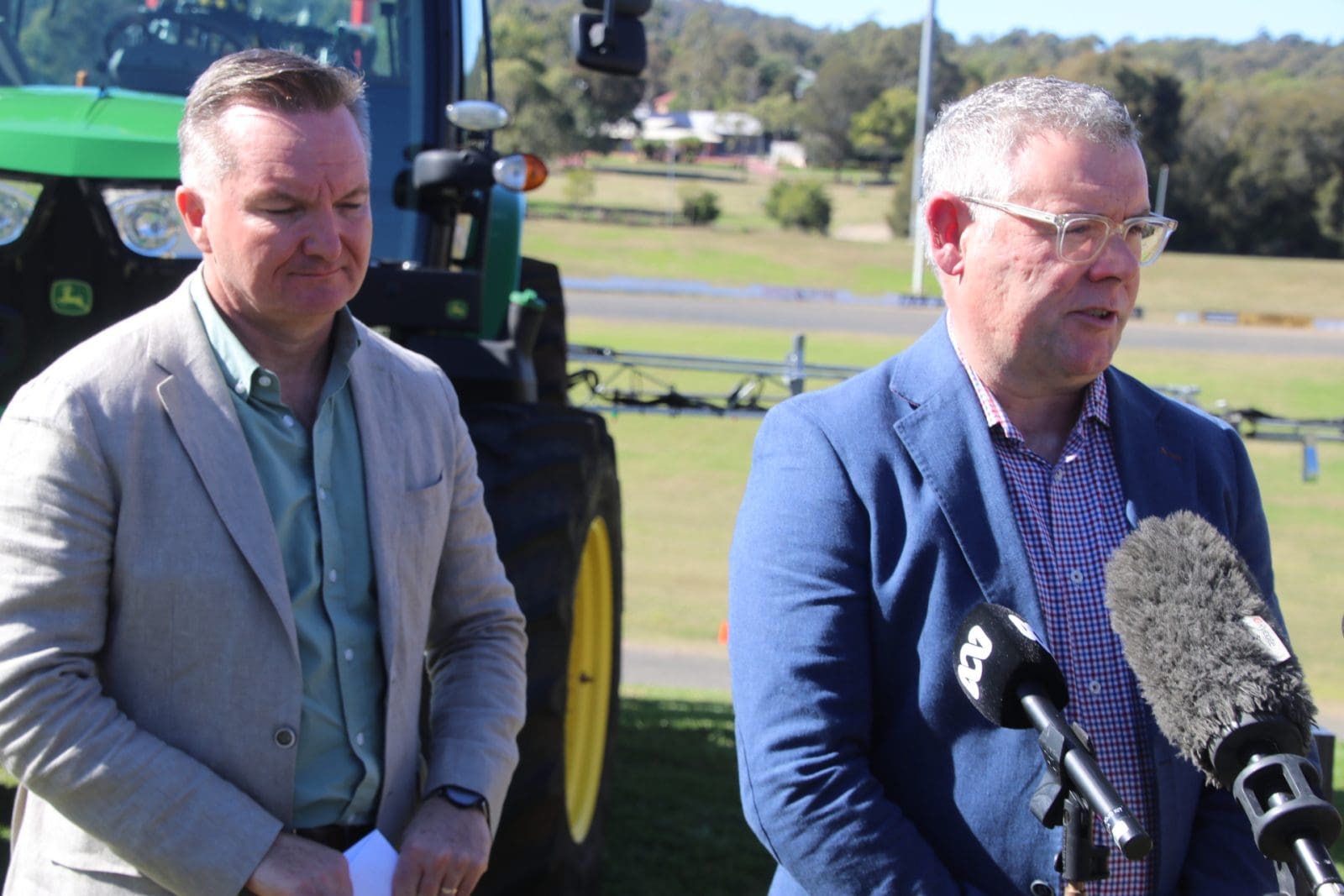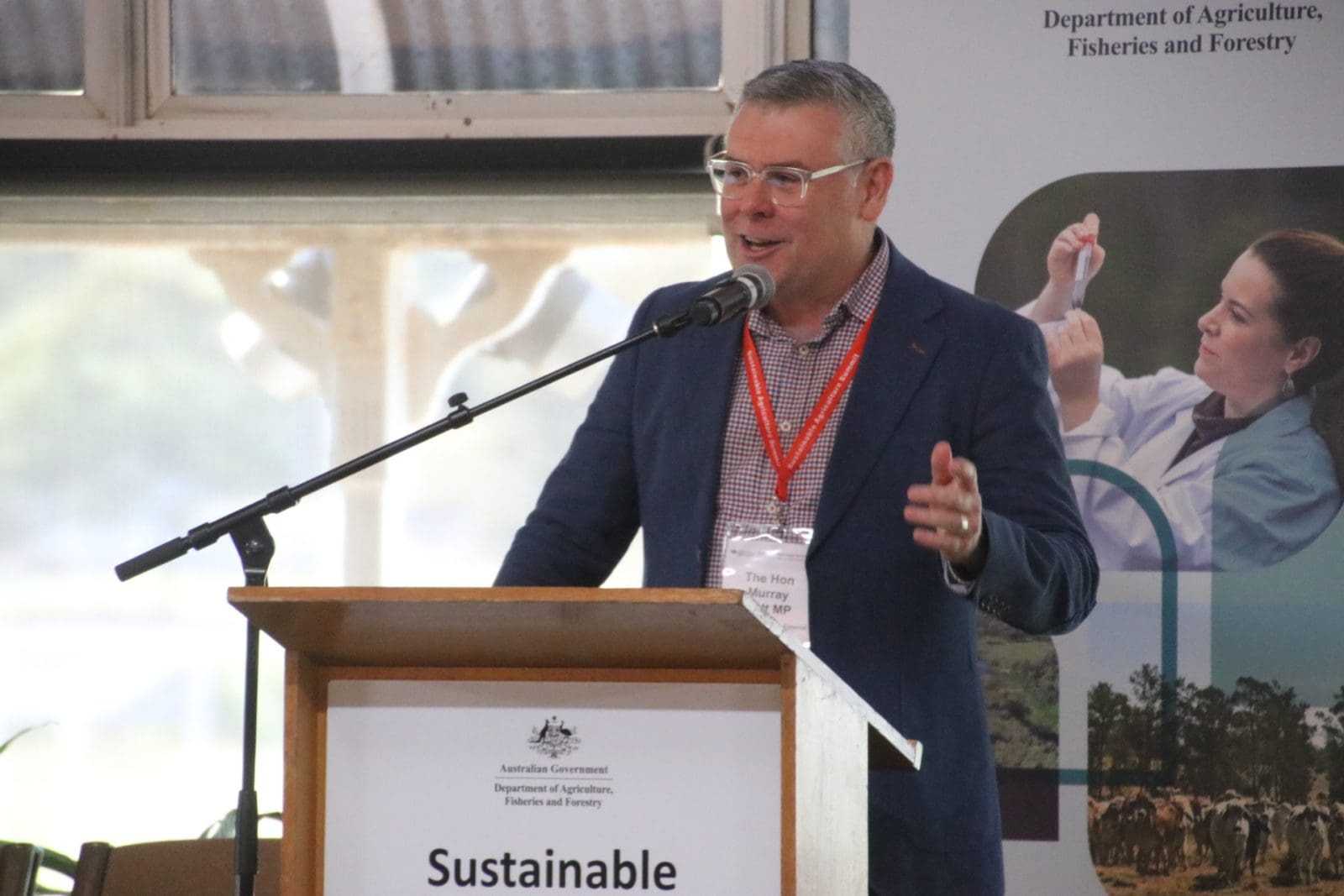
Minister for Energy Chris Bowen and Minister for Agriculture Murray Watt were at the Toowoomba Showgrounds today for the Federal Government’s inaugural Sustainable Agriculture Summit.
FEDERAL Cabinet ministers Murray Watt and Chris Bowen were in Toowoomba today for the Federal Government’s inaugural Sustainable Agriculture Summit.
It convened around 150 public and private-sector representatives to canvass views and feedback on the government’s Agriculture and Land Sector Decarbonisation Plan, which will guide the industry as part of the economy’s transition to the target of net-zero greenhouse gas emissions by 2050.
Minister for Agriculture, Fisheries and Forestry Murray Watt said the grains industry was set to benefit from potential opportunities coming from the government’s goal to reduce economy-wide carbon emissions.
Following the release of a discussion paper in November, the plan is expected to be completed later this year, and Mr Watt said the government would be working with industry to create it.
“We can do that in partnership with industry that makes people more profitable not less, and that is the direction we want to go down,” Mr Watt said.
At the summit, the government released details of $63.8 million announced last week in the 2024-25 Budget to support the reduction of agricultural emissions and contribute to the whole-of-economy transition to net zero.
The package includes funding to improve greenhouse-gas accounting in the ag and land sector, and accelerate on-ground action to reduce their emissions.
It also contains funds for the Department of Agriculture, Fisheries and Forestry to become a partner to the Zero Net Emissions Agriculture Cooperative Research Centre.
Climate Change and Energy Minister Chris Bowen said the package and plan “will unlock new opportunities for Australian farmers and landowners”.
“The Agriculture and Land Plan presents an opportunity to chart a way forward and will play an important role in achieving our whole-of-economy emissions reduction targets,” Mr Bowen said.
“Our government will work in close collaboration with the agriculture industry to guide us towards a net-zero future.”
Buoyant on biofuel
Mr Watt said the grains industry was poised to benefit from growing demand in biofuel and Sustainable Aviation Fuel.
“Already we are seeing some grain producers in Australia supply canola to Europe for manufacturing biofuels.
“I want to see more of that done here.
“We want to be able to produce more of our biofuels, renewable fuels here on-shore with our grains to generate more jobs, more value-adding and more money for Australia.
“This is a really exciting opportunity and I have spoken to a number of the grower organisations (and) bulk handlers, and they are already keen to explore it as well.”
Mr Watt said the Government was open to investigating all forms of biofuel feedstocks.
Agricultural residues from grain crops offered another option to produce renewable fuels that would not compete with food crops, canola and sorghum.
There is currently no supply chain for these feedstocks and required further research but could offer income stream for growers waste.
“We should be looking at every possible option to turn our produce and our residues and waste into something valuable.”
No target for fertiliser emissions
A key source of the grain sector’s on-farm emissions comes from nitrous oxide and carbon dioxide emissions; nitrous oxide from agricultural soils accounted for 16.7 percent of agriculture’s total emissions in 2021, mostly via fertiliser applications and crop residues.
Carbon dioxide from application of urea and lime accounted for another 3.9pc of agriculture’s emissions.

Federal Minister for Agriculture Murray Watt addresses the Sustainable Agriculture Summit in Toowoomba today.
Mr Watt assured industry that the Ag and Land Sector plan would not put “mandates” on the type and quantity of fertilisers growers used.
He said the government had “no agenda” to force growers to cut fertiliser usage nor be made to meet certain emissions targets.
This is in contrast to some countries including Canada, which aims to cut emissions from fertilisers by 30pc by 2030.
“Obviously any fertiliser products and pesticides need to have approval from the APVMA,” Mr Watt said.
“Any chemical has to meet safety standards and that will continue.”
Mr Watt said the plan would work to enable growers to be more efficient with fertilisers.
“I have seen and meet with farmers who have been able to significantly cut their fertiliser bills by moving towards more efficient use of fertilisers.
“It is about efficiencies with productivity which not only delivers better yields and more revenue but also cuts costs.”
Industry submissions invited by the Ag and Land Sector Plan discussion paper focused on the benefits of nitrous oxide inhibitors to reduce fertiliser emissions, and acknowledged that these treated fertiliser products were more expensive than traditional fertiliser.
Mr Watt said he was “really interested” in the potential of these products.
“I think it is a really exciting opportunity for grain farmers to reduce their emissions, but it is also an exciting opportunity as an industry in itself.
“If Australia can become a producer of these types of fertilisers, other countries will buy them, and that is good for us as well.
“We are very interested in exploring it and we will be considering it further throughout the course of this plan.”
Grain Central: Get our free news straight to your inbox – Click here

HAVE YOUR SAY